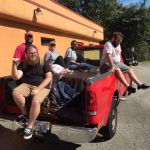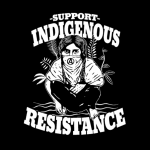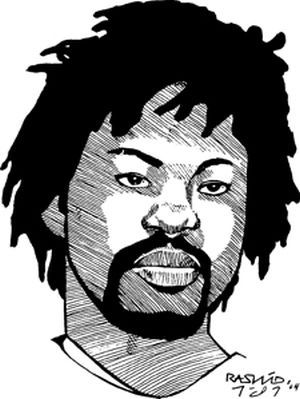
This week on The Final Straw Radio, we feature a conversation with Pearson, an anarchist resident of Tallahassee, Florida, and is involved in storm relief mutual aid work in the wake of Hurricane Michael. Pearson is also the co-host of the leftist podcast “Coffee With Comrades”.
For the hour we talk about Hurricane Michael, which just passed through the Florida Panhandle and up through the Carolinas, affecting Georgia and Alabama as well. Within a 36 hour period, the hurricane ramped up from a Tropical Storm to a category 4 or 5 hurricane (depending on who you talk to). Michael was the strongest hurricane to hit that part of Florida ever on record, making landfall on Wednesday, October 10th in the morning and may be the third largest to hit the U.S. mainland with winds surges of up to 175 miles per hour and sustaining at 150. Because of the quick increase, localities in the storms path found themselves under prepared for such a devastating catastrophe. The state of Florida Department of Corrections refused to evacuate about 12 prisons that were in the Mandatory Evacuation areas in the path of Hurricane Michael despite a call-in campaign by Fight Toxic Prisons.
For the hour, we talk about the immediate response efforts in Tallahassee, Mutual Aid Disaster Relief, anthropogenic or human-caused Climate Change and it’s various impacts on the residents and environs of Florida, and a bunch of other related topics. Later, Pearson shares about his podcast, “Coffee with Comrades”, available at http://coffeewithcomrades.com/
Here are a few links for info if you’re in Florida as well as ways to donate from a distance:
Florida People’s Advocacy Center in Tally is a safe space for people to come for disaster relief (trans inclusive and very supportive of undocumented individuals)
Tallahassee DSA Fund:
http://gofundme.com/dsa-tlh-hurricane-relief-fund
Mutual Aid Disaster Relief:
https://mutualaiddisasterrelief.org/donate/
Amazon Wishlist for the Panhandle:
https://www.amazon.com/gp/registry/wishlist/3QUS9SLT7QD3/ref=cm_wl_huc_view
Announcements
Anti-Racists in Greenville, SC
On Saturday, October 13th in Greenville, SC, there was a racist “Build The Wall” anti-immigration rally organized in support of Trumps xenophobic policies. Naturally, there was a counter-demonstration. Two anti-racists were arrested for picketing ordinances and another for disorderly conduct. If you’d like to help them, there’s a paypal where donations are being collected for legal and any medical fees attached to this at paypal.me/upstatesc
Connor Stevens post-release fund
First, Connor Stevens, one of the convicted Cleveland 4, is up for potential parole as soon as November, 2018! From the fundraizr for Connor:
“Connor Stevens is one of the Cleveland4. He is being released soon so we’re raising funds to help get him basic necessities when he is released! It’s possible he’ll even be released by November!
Click here if you are out of the US and would like to donate via Paypal
The Cleveland 4 were four Occupy Cleveland activists who were were arrested on April 30th, 2012, accused of plotting to blow up a bridge. But it was the FBI, working with an informant, that crafted the plot, produced the “explosives,” and coerced these four into participating.
Connor took non-cooperating plea deals and pled guilty to all charges. The judge applied a “terrorism enhancement” to their sentences, elongating their sentences as well as subjecting them to harsher prison conditions. Connor served 8 years 1 month—all to be followed by lifetime supervised release.”
You can find his post-release fundraiser at: https://fundrazr.com/campaigns/d1PY2c or by searching “Welcome Home Connor Stevens” at fundrazr.com.
To hear our past coverage of the Cleveland 4 case, including an interview with Connors mother, you can check out (our website and search Cleveland 4)
Zak Kostopoulos
Zak Kostopoulos, an 33 year old lgbtq+ drag performer and activist who worked against prejudice faced by folks who are HIV positive was beaten to death in a homophobic attack near Omonia Square in Athens, Greece on September 21st. Zak lept into a jewelry store in order to avoid a nearby brawl when the emergency shutters descended, trapping him inside. He was then set upon by the owner of the shop and others who were heard uttering homophobic and hate statements against those with HIV. After escaping the store, by smashing through the window with a fire extinguisher, he was followed out by the owner and another thug. Zak was beaten to the ground while surrounded by mostly male onlookers. When police showed up, they handcuffed Zak. The murder was captured on camera. The shop owner was only arrested after the video went viral and he was only charged with manslaughter, not murder, as he claims to have been protecting his property, which is absurd. Following news of the murder, an emergency anarchist assembly was called and a march of 500 took the streets of Athens with smaller marches happening in nearby cities. Marches followed that week.
Apologies for the wait in announcing this sad news which a listener sent us after the murder took place. We are thankful for being informed.
Mumia Abu-Jamal
There is a call for supporters of Mumia Abu-Jamal to fill the court room and the streets on October 29th from 8am til 11am in Philadelphia at the Criminal Justice Center, 13th & Filbert. Mumia is a former Black Panther, is a journalist and Political Prisoner who was put on death row for decades for the killing of a cop he says he did not commit. Mumia’s trial has been recognized internationally, including by Amnesty International, as a political show trial. More info up at http://mobilization4mumia.com
Certain Days Calendar benefit show
On October 19th at the Pine Box Rock Shop, 12 Gratton Street in Brooklyn, NY, there’ll be a benefit for post-release funds by the organizers of the Certain Days: Freedom For Political Prisoners Calendar.
From Certain Days:
In the last year, we have been fortunate enough to welcome home a handful of political prisoners from US prisons. Our movements have not exactly been prepared for this good fortune, and so support committees, families and friends of these folks have been forced to scramble for funds for basic living expenses. In addition to that, many of these people have been targeted in the media and beyond by various law enforcement unions and organizations, making open fundraising online a difficult proposition.
We need to step up our game and aid not only the handful of political prisoners that have been released this year but also, the people who may be leaving prison soon.
The show will feature performances by Despairwolf, MAAFA_Hardcore, High Cost, and Trophy hunt, and we understand that the door fee will be VERY reasonable for a show in NYC.
. … . ..
Playlist here.





